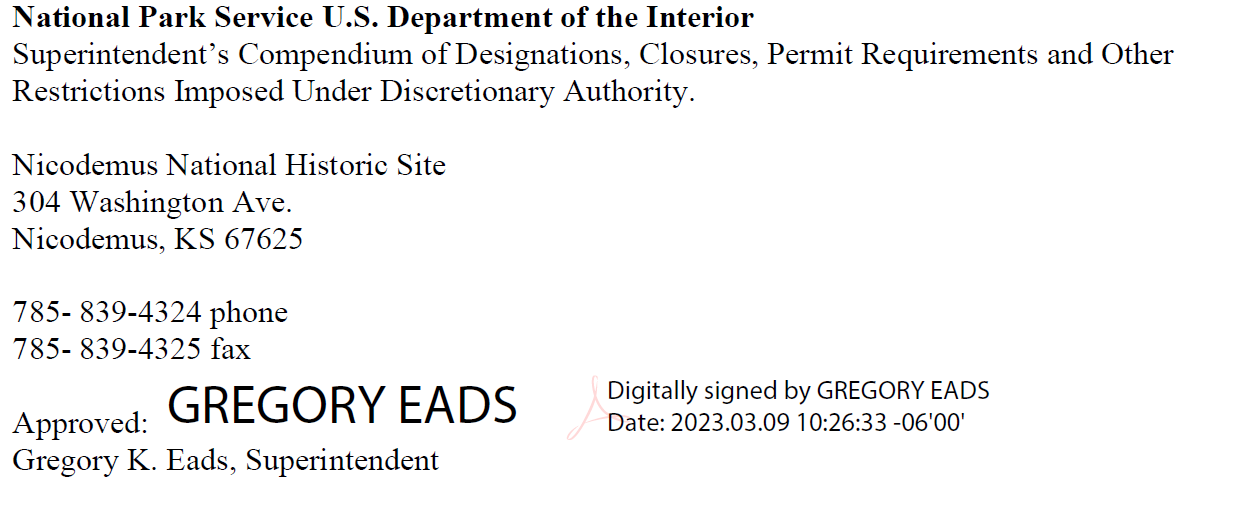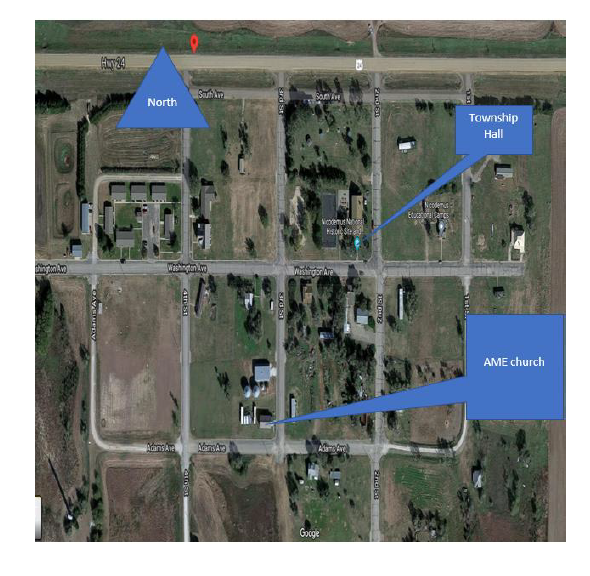
National Park Service U.S. Department of the Interior A. INTRODUCTION1. Superintendent’s Compendium DescribedThe Superintendent’s Compendium is the summary of park specific rules implemented under 36 Code of Federal Regulations (36 CFR). It serves as public notice, identifies areas closed for public use, provides a list of activities requiring either a special use permit or reservation, and elaborates on public use and resource protection regulations pertaining specifically to the administration of the park. The Superintendent’s Compendium does not repeat regulations found in 36 CFR and other United States Code and CFR Titles, which are enforced without further elaboration at the park level. 2. Laws and Policies Allowing the Superintendent to Develop This CompendiumThe National Park Service (NPS) is granted broad statutory authority under 54 United States Code (U.S.C.) Section 100101A to “…regulate the use of the Federal areas known as national parks, monuments, and reservations…by such means and measures as conform to the functional purposes of the said parks…which purpose is to conserve the scenery and the natural and historic objects and the wildlife therein and to provide for the enjoyment for future generations” (16 U.S.C. Section 1). In addition, 54 USC §10075 allows the NPS, through the Secretary of the Interior, to “make and publish such rules and regulations as he may deem necessary or proper for the use and management of the parks, monuments, and reservations under the jurisdiction of the National Park Service.” 3. Consistency of This Compendium with Applicable Federal Law and RequirementsThe Superintendent’s Compendium is not considered a significant rule requiring review by the Office of Management and Budget under Executive Order 12866. In addition, this Compendium will not have a significant economic effect on a number of small entities nor impose a significant cost on any local, state or tribal government or private organization, and therefore does not fall under the requirements of either the Regulatory Flexibility Act or the Unfunded Mandates Reform Act. 4. Development of the Requirements of the Superintendent’s CompendiumAs outlined above, the NPS has broad authority and responsibility to determine what types of uses and activities are appropriate in any particular National Park System area. The requirements of the Superintendent’s Compendium are developed through an analysis and determination process. The decision criteria used during this process are:
5. Applicability of the CompendiumThe rules contained in this Compendium apply to all persons entering, using, visiting or otherwise present on Federally owned lands, including submerged lands, and waters administered by the NPS within the legislative boundaries of the park. This includes all waters subject to the jurisdiction of the United States, including all navigable waters. 6. Enforcement of Compendium RequirementsNPS Law Enforcement Park Rangers enforce the requirements of the United State Code, 36 CFR, and this Superintendent’s Compendium. 7. Penalties for Not Adhering to the Compendium RequirementsA person who violates any provision of the regulations found in 36 CFR, Parts 1-7, or provisions of this Compendium, is subject to a fine as provided by law (18 U.S.C. 3571) up to $5,000 for individuals and $10,000 for organizations, or by imprisonment not exceeding six months (18 U.S.C. 3559), or both, and shall be adjudged to pay all court costs associated with any court proceedings. 8. Comments on the CompendiumThe Compendium is reviewed annually and revised as necessary. The park welcomes comments about its program and activities at any time. 9. Effective Date of the Superintendent CompendiumThe Superintendent’s Compendium is effective on the approval date listed on the first page of this document and remains in effect until revised for a period up to one year. 10. Additional InformationSome of the terms used in this Compendium may have specific meaning defined in 36 CFR 1.4 11. AvailabilityCopies of the Compendium are available at 304 Washington Ave., Nicodemus, KS 67625. B. SUPERINTENDENT’S COMPENDIUMIn accordance with regulations and the delegated authority provided in Title 36, Code of Federal Regulations (“36 CFR”), Chapter 1, Parts 1-7, authorized by Title 54 U.S.C. §100751, the following provisions apply to all lands and waters administered by the National Park Service, within the boundaries of Nicodemus National Historic Site. Unless otherwise stated, these regulatory provisions apply in addition to the requirements contained in 36 CFR, Chapter 1, Parts 1-7. 36 CFR §1.5 – VISITING HOURS, PUBLIC USE LIMITS, CLOSURES, AND AREA DESIGNATIONS FOR SPECIFIC USE OR ACTIVITIESa)(1) The following visiting hours and public use limits are established for all or for the listed portions of the park, and the following closures are established for all or a portion of the park to all public use or to a certain use or activity:
Determination: For reasons of fire safety and public safety.
Determination: For reasons of public safety and respect of private property owners’ rights For reasons of public safety and respect of private property owners’ rights Filming Activities5.5 Commercial filming, still photography, and audio recording: Unmanned AircraftLaunching, landing, or operating an unmanned aircraft from or on lands and waters administered by the National Park Service within the boundaries of Insert Park Name is prohibited except as approved in writing by the Superintendent. Masks -Covid-19 (Mask Requirements)When the COVID-19 Community Level is LOW or MEDUIM in Graham County based on data provided by the Centers for Disease Control and Prevention (CDC), individuals are not required to wear masks. When the COVID-19 Community Level is HIGH in Graham County based on data provided by the CDC, all individuals over the age of two must wear masks, regardless of vaccination status, in all common areas and shared workspaces in buildings owned, leased, or oterwise controlled by the National Park Service, including, but not limited to, park visitor centers, administrative offices, lodges, gift shops and restaurants. When the COVID-19 Community Level is HIGH in Graham County based on data provided by the CDC, the superintendent will determine whether individuals are required to wear masks. The requirement, if any, will apply to all facilities within the park. Regardless of vaccination status or local community transmission levels, all individuals over the age of two must wear masks, except when actively eating or drinking, in all common areas and shared workspaces in federally owned buildings administered by the National Park Service and in office space leased by the National Park Service. OccupancyThe number of visitors in the following indoor locations may not exceed the maximum occupancy identified for each location.
36 CFR §1.6 – ACTIVITIES THAT REQUIRE A PERMIT(f) The following is a compilation of some activities for which a permit from the superintendent is required: §2.4(d) Carry or possess a weapon, trap, or net (excluding legal firearms)§2.5(a) Specimen collection (Take plant, fish, wildlife, rocks or minerals)§2.12 Audio Disturbances:(a)(4) Operation of a public address system in connection with a public gathering or special event for which a permit has been issued pursuant to §2.50 or §2.51 §2.37 Soliciting or demanding gifts, money goods or servicesSoliciting or demanding gifts, money, goods or services is prohibited except pursuant to the terms and conditions of a permit issued under §2.50 (Special Events), §2.51 (Demonstrations) or §2.52 (Distribution of printed matter). §2.38 Explosives:
§2.50(a) Special EventsSporting events, pageants, regattas, public spectator attractions, entertainment, ceremonies, and similar events. §2.51(a) Public assemblies, meetings, gatherings, demonstrations, parades and other public expressions of views(a) Demonstrations includes picketing, speechmaking, marching, holding vigils or religious services and all other like forms of conduct that involve the communication or expression of views or grievances, engaged in by one or more persons, the conduct of which is reasonably likely to attract a crowd or onlookers.
(c2) All demonstrations will be held in designated areas. Designated areas include:
§2.52(c) Sale or distribution of printed matter and other message-bearing items.Printed matter is message-bearing material such as books, pamphlets, magazines, and leaflets, provided that it is not solely commercial advertising. Other message-bearing items include: Readable electronic media such as CDs, DVDs, and flash drives; clothing and accessories such as hats and key chains; buttons; pins; and bumper stickers. §5.1 Advertisements(Display, posting or distribution.) §5.3 Engaging in or soliciting any business(Requires a permit, contract or other written agreement with the United States, or must be pursuant to special regulations). §5.5 Commercial filming, still photography, and Audio Recording:For permit information and applications, contact the Park Superintendent, 304 Washington Ave, Nicodemus, KS 67625 or call 785-839-4324. GENERAL REGULATIONS36 CFR §2.1 - PRESERVATION OF NATURAL, CULTURAL AND ARCHEOLOGICAL RESOURCESa)(5) The following conditions are in effect for walking, climbing, entering, ascending or traversing the listed archeological or cultural resource, monuments or statues:
Determination: Visitors are to respect private property owners’ rights. 36 CFR §2.11 – PICNICKINGVisitors may use the Roadside Park for Picnicking.
Determination: Fire is a threat to the resource and the surrounding agricultural fields. Improperly disposed trash is a threat to public health and safety.
(a)(2) The following restrictions are in effect for the use of stoves or lanterns:
Determination: Fire is a threat to the resource and surrounding agricultural fields. As per 36 CFR & 2.13 (a)(1) and &2.13 (a)(2) 36 CFR §2.15 – PETS(a)(1) The following structures and/or areas are closed to the possession of pets:
(a)(2) Pets must be restrained on a leash that does not exceed six feet in length at the following locations:
Determination: Potential for injury due to close contact of animals with other Park Visitors.This restriction does not apply to guide dogs for the visually or hearing impaired or those suffering from seizures.
Determination: Animal waste is a threat to visitor health. 36 CFR §2.21 – SMOKINGThe following portions of the park, or all or portions of buildings, structures or facilities are closed to smoking as noted:
Determination: Smoking is prohibited to protect park resources, reduce the risk of fire or prevent conflicts among visitor use activities.[2.12(a)] 36 CFR§2.31- TRESPASSING, TAMPERING and VANDALISMThe following portions of the park are prohibited from trespass, except with express invitation or consent of the person(s) having lawful control of the property or real property.
Determination: Respect of private property owners’ rights. 36 CFR §2.35 –ALCOHOLIC BEVERAGES and CONTROLLED SUBSTANCES(a)(3)(i) The following public use areas, portions of public use areas, and/or public facilities within the park are closed to consumption of alcoholic beverages, and/or to the possession of a bottle, can or other receptacle containing an alcoholic beverage that is open, or has been opened, or whose seal has been broken or the contents of which have been partially removed:
Determination: Public consumption of alcoholic beverages and controlled substances is contrary to the purposes for which the park was established. Public consumption of alcoholic beverages on park roadway, and historic structures, throughout the park would create an unsafe environment and inappropriate use of the parks natural and cultural resources. 
On September 23, 2021, the Superintendent designated paved roads and parking areas as open to electronic bicycles and motor vehicles within the historic Townsite of Nicodems. Allowing electronic bicycles on public roads and in parking areas will create new opportunities for recreation and access within the park. It will not create any adverse impacts to park visitors, resources or values due to the existing use of these locations by motor vehicles and bicycles. Bicycle use must be consistent with protection of the park area's natural, ciltural, scenic and aesthetic values, safety considerations and management objectives, and will not disturb park resources or private property within the Townsite of Nicodemus. Last updated: 03.09.2023 |
Last updated: March 9, 2023
